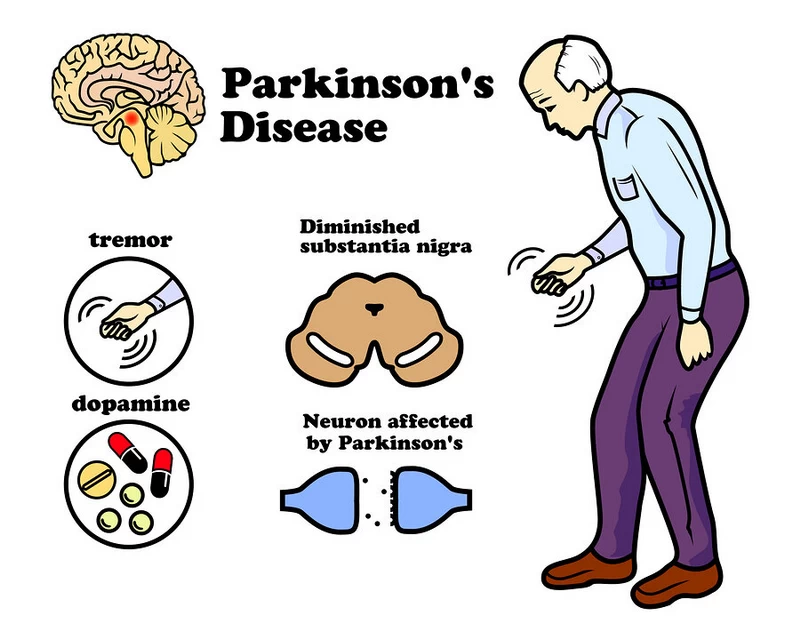What is Parkinson’s Disease? 什么是帕金森病(PD)?
Parkinson’s disease is a progressive disorder (一种进行性疾病) that is caused by degeneration of nerve cells in the part of the brain called the substantia nigra (黑质), which controls movement. These nerve cells die or become impaired, losing the ability to produce an important chemical called dopamine (多巴胺[ˈdoʊpəmiːn]). Studies have shown that symptoms of Parkinson’s develop in patients with an 80 percent or greater loss of dopamine-producing cells in the substantia nigra (黑质神经细).
帕金森氏症是一种进行性疾病,是由大脑中控制运动的黑质神经细胞退化引起的。这些神经细胞死亡或受损,失去产生一种叫做多巴胺的重要化学物质的能力。研究表明,产生多巴胺的黑质细胞损失80%或更多的患者会出现帕金森病的症状。

Normally, dopamine operates in a delicate balance with other neurotransmitters (神经递质)to help coordinate the millions of nerve and muscle cells involved in movement. Without enough dopamine, this balance is disrupted, resulting in tremor 震颤 (trembling in the hands, arms, legs and jaw); rigidity (stiffness of the limbs); slowness of movement; and impaired balance and coordination – the hallmark symptoms of Parkinson’s. (from aans.org)
正常情况下,多巴胺与其他神经递质保持微妙的平衡,帮助协调数百万参与运动的神经和肌肉细胞。没有足够的多巴胺,这种平衡就会被破坏,导致震颤(手、胳膊、腿和下巴颤抖);僵硬(四肢的僵硬);运动缓慢;平衡和协调能力受损——这是帕金森症的典型症状。
What causes Parkinson’s Disease? 帕金森病的病因是什么?
Although there are several recognized risk factors for Parkinson’s disease, such as exposure to pesticides, for now, the only confirmed causes of Parkinson’s disease are genetic (遗传因素). When Parkinson’s disease isn’t genetic, experts classify it as “idiopathic”( 特发性[ˌɪdioʊˈpæθək])(this term comes from Greek and means “a disease of its own”). That means they don’t know exactly why it happens.
虽然帕金森病有几个公认的危险因素,比如接触杀虫剂,但目前唯一确认的帕金森病原因是遗传因素。当帕金森氏症不是遗传性疾病时,专家将其归类为“特发性”(这个术语来自希腊语,意思是“一种自身的疾病”)。这意味着他们不知道为什么会发生这种情况。
Many conditions look like Parkinson’s disease but are instead parkinsonism 帕金森综合征(which refers to Parkinson’s disease-like conditions) from a specific cause like some psychiatric medications. (from levelandclinic.org)
许多疾病看起来像帕金森氏症,但实际上是帕金森综合征(指类似帕金森氏症的疾病),是由特定原因引起的,比如一些精神药物。
Parkinson’s Disease (帕金森病)is caused mainly by the degeneration of nerve cells in the brain, while the causes of parkinsonism (帕金森综合征) are numerous, ranging from the side effects of medications to chronic head traumas to metabolic diseases to toxins to neurological diseases.
帕金森氏症主要由大脑神经细胞的退化引起,而导致帕金森综合征的原因很多,从药物的副作用到慢性头部创伤,从代谢疾病到毒素,再到神经系统疾病。
The symptoms of Parkinson’s Disease? 帕金森病的症状
Symptoms generally develop slowly over years. The progression of symptoms is often a bit different from one person to another due to the diversity of the disease. People with PD may experience:
症状通常在数年内缓慢发展。由于疾病的多样性,症状的进展通常因人而异。帕金森病患者可能会经历:
Tremor: mainly at rest (静止时颤抖)and described as pill rolling tremor in hands(手搓药丸式的颤抖); other forms of tremor are possible
震颤:主要是静止时颤抖和手搓药丸(PILL-ROLLING)的式的震颤;其他形式的震颤也是可能的。
Slowness and paucity of movement (called bradykinesia and hypokinesia)
运动缓慢和缺乏运动(称为运动迟缓和运动不足)
Limb stiffness (rigidity) 肢体僵硬(僵直)
Gait and balance problems (postural instability) 步态和平衡问题(姿势不稳定)
In addition to movement-related (“motor”) symptoms, Parkinson’s symptoms may be unrelated to movement (“non-motor”). People with PD are often more impacted by their non-motor symptoms than motor symptoms. Examples of non-motor symptoms include: depression, anxiety, apathy, hallucinations (幻觉), constipation, orthostatic hypotension (直立性低血压), sleep disorders, loss of sense of smell, and a variety of cognitive impairments (认知障碍). (from parkinson.org )
除了运动相关(“运动”)症状外,帕金森病的症状可能与运动无关(“非运动”)。帕金森病患者通常更容易受到非运动症状的影响而不是运动症状。非运动症状的例子包括:抑郁、焦虑、冷漠、幻觉、便秘、直立性低血压、睡眠障碍、嗅觉丧失和各种认知障碍。
How to treat Parkinson’s Disease? 如何医治帕金森病?
Although there is no cure, treatment options vary and include medications, lifestyle adjustments and surgery. While Parkinson’s itself is not fatal, disease complications can be serious. The Centers for Disease Control and Prevention (CDC) rated complications from PD as the 14th cause of death in the U.S. (from parkinson.org/)
虽然无法治愈,但治疗方案多种多样,包括药物治疗、生活方式调整和手术。虽然帕金森氏症本身并不致命,但疾病并发症可能很严重。美国疾病控制与预防中心(CDC)将PD并发症列为美国第14大死亡原因。
Parkinson’s Disease Prevention 帕金森病预防
Because the cause of Parkinson’s is unknown, there are no proven ways to prevent the disease.
由于帕金森氏症的病因尚不清楚,目前还没有行之有效的方法来预防这种疾病。
Some research has shown that regular aerobic exercise (有氧运动) might reduce the risk of Parkinson’s disease.
一些研究表明,有规律的有氧运动可能会降低患帕金森病的风险。
Some other research has shown that people who consume caffeine — which is found in coffee, tea and cola — get Parkinson’s disease less often than those who don’t drink it. Green tea also is related to a reduced risk of developing Parkinson’s disease. However, it is still not known whether caffeine protects against getting Parkinson’s or is related in some other way. Currently there is not enough evidence to suggest that drinking caffeinated beverages protects against Parkinson’s. (from mayoclinic.org)
其他一些研究表明,摄入咖啡因(咖啡、茶和可乐中含有咖啡因)的人患帕金森病的几率比不喝咖啡因的人要低。绿茶还与降低患帕金森病的风险有关。然而,目前还不清楚咖啡因是否能预防帕金森症,或者是否与其他方式有关。目前还没有足够的证据表明饮用含咖啡因的饮料可以预防帕金森病。
